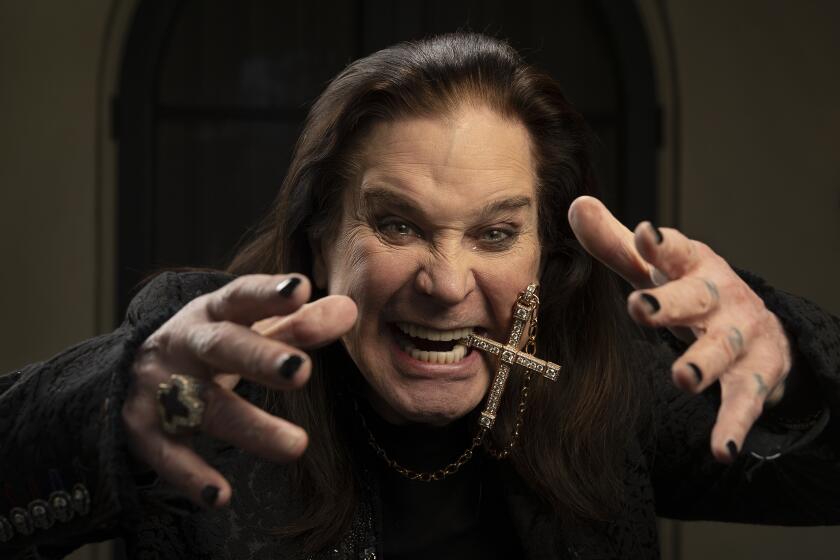MTV LA BAMBA PARTY--ADMAN’S COUP
- Share via
Anyone who’s spent the past few years watching MTV knows this much: Marketing is the real art form of the ‘80s.
For the unconvinced, we recommend MTV’s “La Bamba” movie-premiere party, an hourlong special filmed last weekend at the Palace, which airs tonight at 6 on the 24-hour video channel. The program features live performances by artists like Los Lobos and Brian Setzer, as well as interviews with a host of celebrities. But what really makes the show such an event is the way it seamlessly plugs a wide assortment of pop products.
Who benefits? First, of course, Columbia Pictures, which is releasing “La Bamba,” the new film about ‘50s rocker Ritchie Valens. (Every performer at the party, for example, played a song featured in the film.) Next up: Warner Bros. Records, which has the film’s sound track, featuring the same performers on display at the party.
Then there’s MTV, which gets what amounts to an exclusive free hour of celebrity-studded entertainment programming (not to mention the hip imprimatur of being associated with such a trendy bash). And let’s not forget Coca-Cola, Columbia’s parent company, which decorated the party with an arsenal of tasteful ‘50s Coke signs, guaranteeing a free product-plug regardless of which direction the cameras were pointing.
It’s hardly a big deal anymore to see pop music or films serving different commercial masters--not in an era when the Beatles’ “Revolution” sells running shoes. But after examining MTV’s cozy, back-scratching relationship with various film and record companies (and corporate sponsors), you begin to wonder where real programming ends and marketing plugs begin.
According to several sources involved with MTV movie-premiere contract negotiations, extravaganzas like the “La Bamba” blast or the recent “Dragnet ‘87” party are a great deal for everybody. For MTV, they’re essentially free programming--either movie companies (like Columbia) or corporate sponsors (Miller Beer for “Dragnet”) pick up the tab for production costs. MTV also gets a sizable commitment from movie companies (as much as $400,000) to advertise the film on the 24-hour video network.
In return, MTV assures that music videos touting the film will appear in high-level rotation during the key weeks surrounding the film’s opening. The video channel also runs numerous MTV music-news items and interviews, promotion spots, contests (and, in the case of “Dragnet,” even ran old episodes of the TV show).
Don’t think movie companies and record labels don’t salivate at the prospect of this marketing bonanza. As Lee Masters, general manager of MTV and VH-1, put it: “Particularly during the summer, we get one or two offers each week from film companies who’d like to do a movie-premiere event with us.”
MTV guards against overexposure; the channel only did two events this summer, and carefully selects films with either a music theme (“La Bamba”) or an MTV-style personality (“Dragnet’s” Tom Hanks or Pee-wee Herman, whose “Big Adventure” film also got the premiere treatment).
Still, a premiere-party event is a coup. “The exposure we get is tremendous,” said Bob Merlis, vice president at Warner Bros. Records, which released the “La Bamba” sound track. “It’s a great marketing package--and MTV promotes the hell out of it. I can guarantee you that the name Marshall Crenshaw , after he’s appeared on the premiere-party program, will mean more than it did last week. People get to see him perform, he’s associated with a happening event and you hope it’ll rub off on his album.”
According to Masters, MTV rarely gets to see a finished film before a decision is made to go ahead with a premiere-party event. “We try to see a rough cut or something,” he said. “We’re looking for the MTV-attitude personality--someone like Pee-wee Herman or Prince--who we feel will be of interest to our viewers.
“We try to be very selective, because we’re essentially putting the MTV seal of approval on the film. The viewer is obviously going to see the kind of coverage we give as an endorsement.” (Despite this cautious attitude, MTV still makes an occasional blunder, the worst being its large-scale promotions surrounding “American Anthem,” a huge 1986 flop.)
Masters confirmed that either the film company or corporate sponsor pays for the channel’s production costs, adding, “It’s certainly not a revenue center for us--we do it at a break-even price.”
And he admitted that film companies do promise MTV hefty ad buys, ranging from $250,000 to $500,000, depending on the film. “We make our living selling advertising,” he said. “If we did a whole marketing pitch for a film, and we didn’t insist on a major advertising commitment from the motion-picture studio, we’d be fools. The film companies would probably all say, ‘Geez, who needs to buy ads when we can get all this coverage for free.’ ”
But Masters insists these marketing ploys don’t influence MTV programming. “Listen, there’s hype everywhere,” he said. “You could say that the whole ‘Entertainment Tonight’ half hour is one big plug for whoever’s on. But our playlist is a sacred area, which is immune to commercial pressures. When we present a package to a film company, the product has to stand on its own feet. If a clip isn’t appropriate, it won’t get on. In fact, we had a very uncomfortable situation involving a certain film--which I won’t name--where the clip wasn’t right and we wouldn’t play it, despite considerable pressure from the motion picture company.
“You can’t break your promise with the viewer. If they feel they’re being spoon-fed a commercial, the whole process breaks down. It won’t work if you’re not offering genuine entertainment, because the viewer won’t pay any attention the next time you come around.”
More to Read
The biggest entertainment stories
Get our big stories about Hollywood, film, television, music, arts, culture and more right in your inbox as soon as they publish.
You may occasionally receive promotional content from the Los Angeles Times.










